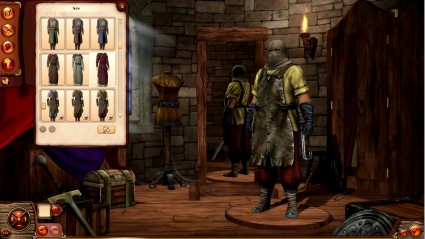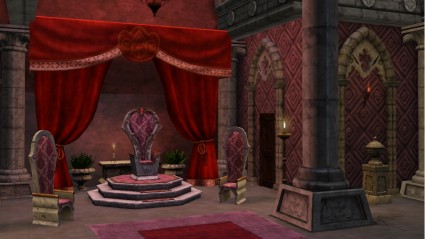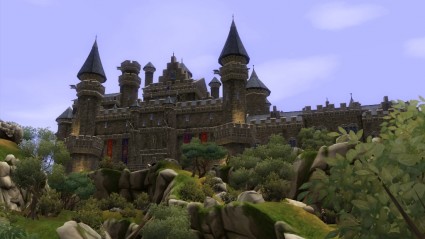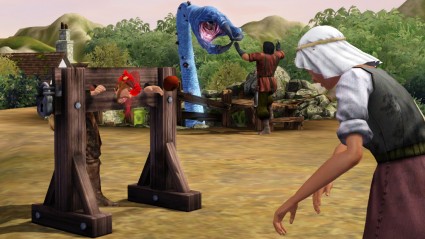Reviews
Review: The Sims Medieval
November 24, 2011, Author: Andy Corrigan
I’ve almost had enough of the Sims this year, having reviewed three iterations of the series on two different platforms. There’s only so many times you can really say the same things about it, which makes reviewing each one an incrementally difficult proposition. The Sims is the Sims; it is what it is, and usually you’ll know if you like it or not.
I was sent a review copy of Sims Medieval a while back, but already being a good period after release and with more important and urgent games to review between then and now, it was put to the wayside. Thanks to a delay with another review copy I’ve been expecting, I’ve had some time spare to take a look.
I’ll admit, I was dreading a lazily re-skinned Sims title, but what I actually got was a lite-RPG in Sim’s clothing. Let me boldly state now: The Sims: Medieval is a complete breath of fresh air for the series.
Finally, a semblance of plot!
In the past three Sims reviews I’ve done, I’ve typed the same guffins about creating your own stories and happenings. I’ve hated doing it three times, but it’s really the only fair way to describe the typical Sims experience. Not this time!
Thankfully, I don’t have to type those words here (except I kinda already did, didn’t I?!) as The Sims Medieval not only has a lot of uncharacteristic direction and focus, but there is actually a general plot to be found that explains you overseeing the lives of a handful of specific ‘hero’ Sims.
You see, you are The Watcher, a powerful God, a figure of worship for a primitive civilisation. You’ve always favoured a hands-off approach, accepting the love of your people, and they were happy with that, for a time. Then they got complacent and stupid as their civilisation evolved. Greed, violence, disease and famine have washed over the land, leaving them in turmoil.
Unable to interfere directly on such a large scale, in your Godly wisdom, you figure that your best shot is to create some heroes that you can gently guide, ones that will inspire your people to sort themselves out and lead them on to happier lives.

The creation tool isn't as detailed, but you'll tailor certain classes of character this time...
More of a point n’ click RPG…
What that means is, in spite of the core controls being instantly familiar, you won’t be creating a household and just endlessly be playing with no aim. In fact, although some deep customisation is still entirely possible (on the characters, anyway), the game actually tries to steer you away from it. Let me explain.
For starters, it’ll take a while before the game will even let you create anything. When you begin, you must choose an ambition. This will define the aims of your play-through and the types of quests you will get. The first time you fire up the game you’ll be restricted to just one of them, and that is ‘New Beginnings’. This ambition will include your lengthy tutorial (which you can’t save during) and a number of quests to complete there-in before you can achieve your goal. The other ambitions have certain requirements you have to achieve in the game before you can select them, so for example you might need to have reached a particular renown level, or you might need to have got so many types of hero with certain skills.
Now, this is where my only major disappointment with the game came in; once you’ve done enough quests and completed your chosen ambition, you ‘win’ the game and all questing ceases unless you quit out, choose a new ambition and start your kingdom all over again. You can carry on your game as if it were a normal Sims title, but it’s ultimately pointless without being able to earn XP and level up your heroes. I don’t see why the ambitions couldn’t have been built or layered on top of existing ones to keep that ongoing feeling of progression, but I guess in some ways it takes a little step towards the Civilisation series. Essentially, each ambition is a ‘level’, and you have to reach your aim.
This is made up by the fact that strategy comes into it as you get further into the game, as it becomes possible to fail at your chosen ambition. The quests you choose cost Quest Points, and each ambition only has a set number of Quest Points that you’re allowed to spend, so in some cases you’ll need to pick your quests carefully to make sure you get maximum reward towards completing your goal. It also offers you a way to play the game many times in a multitude of ways. It’s relatively short bursts compared to what Sims fans will be used to, but highly replayable.
Anyway, once your ambition is chosen, you name your kingdom and select whether you’d like the throne room furnished or unfurnished, affecting how much money you start the game with. Then you can choose or create your first hero to control, who in the first instance will be the King or Queen.
It’s here where you notice the first steps of the game shooing you towards ready-made Sims rather than your own, offering you a choice of two with vastly differing personalities, with the option to create your own oddly easy-to-miss. This set-up does, however, make the game a lot more accessible to those who just want to jump in and follow the myriad of quests, which is undoubtedly a lot of fun.

You can decorate your throne room...
Still, for the sake of review I opted to test out the creation tool. Here, not much has changed apart from the Medieval themed outfits, of which there aren’t many to choose from; they’re tied in with the type of character you’re making. You can’t put your King in beggars’ clothes or a priest in royal clothes, but there’s enough customisation with colours to create a fitting look that you’re comfortable with.
After the design process, you’ll also notice the first major difference; you don’t pick a lifetime goal. It’s already been set via the ambition. You do have to pick some traits, though; you pick two standard ones, and one called a ‘Fatal Flaw’, and all are tailored towards this new, medieval setting.
So, on the standard traits you can make your hero adventurous, dedicated or vain, but their Fatal Flaw will give them one major weakness that you might need to manage along the way. For example, my King was assigned the Licentious flaw, which meant he was always frisky, wanting mostly do the horizontal dance with a fair maiden to keep himself satisfied and focused. If that doesn’t do it for you, you can instead choose to make them bloodthirsty, cruel or drunk. There’s a decent number of options and they’ll all have an impact on how you might have to manage them.
Once done, you can start the game proper, and great fun it is to get stuck right in. Instead of a house, you start with a castle and a selection of royal staff already assigned. The throne room acts as your base of operations (you’ll have other characters and buildings with which to operate from later, though), with different areas and desks where you can manage certain aspects of the game.
The major difference here is that for once, you don’t have to cater to your Sim’s every need. You don’t need to bathe them, or guide them to the toilet whenever they need a pee; the only things you need to watch are their hunger and energy, and managing those accordingly in-between the questing is fairly painless. You also don’t have to clean, repair things, wash dishes, and you only need to manage relationships if it’s part of the storyline. You do have to keep them placated to keep them focused ( which means a ‘Focus’ meter instead of a ‘Happiness’ meter), and you do so by keeping them fed, rested and battling their Fatal Flaw. Doing this will make task completion an easier and quicker exercise. Losing focus won’t just mean poor results in quests; it could mean certain death.
This lighter Sim-management means that you can concentrate on adventuring and exploring the storylines that the quests make up, and while Sims stalwarts might balk at the idea, this is a lot more fun that managing a household. It’s certainly much more fun than instructing someone when to take a piss or a bath. Making the fun stuff the focus instead of an afterthought or optional content is something that this series has needed, even if only in a spin-off.
Each quest will take you on wacky adventures in your kingdom. After you get past the initial tutorial quest, you’ll be in a position to pick and choose the ones you want to do, and just like in typical RPGs you can manage these as you want via a quest book. Once one is selected, you’ll follow the cues to do all the necessary bits in order, and by completing them, you’ll earn XP. It’s not a sandbox game, but an RPG with a Sims control interface.
The initial quests of the ‘New Beginnings’ ambition, for example, will see you undertake basic tasks, such as collecting materials to start building your empire, protecting besmirched wenches, building your next key building and creating a new hero. Eventually you’ll need to check out the political situation between you and your neighbouring cities and towns, and keep good relationships. You’ll do other kingly duties; write new rules, put votes to the people. You can take court and listen to the plights of the people and help or hinder them with their requests. In the first hour alone I’d had a duel, killed a bear, put someone in the stocks and given some romantic advice to an ambassador’s wife while the couple visited from a neighbouring kingdom, which helped keep their nation sweet. All these quests are brilliantly written; at their worst mildly witty, and at their best, genuinely funny.

King of the castle...
Some of the quests will offer you two very different paths to completion, and during some of them you’ll be asked which route you want to take, normally between good and evil. Both change the quest lines a little, and it’s really nice to have this choice along the way, giving you further opportunity to dictate the way you play.
Some parts of the quests aren’t that complete or as full as you would like, though, and are akin to going to work on the other Sims games. So heading into the forest to hunt means sitting there looking at trees while a progress bar fills up along the top. It’s nothing major, as it’s a quick process and is a small part of the bigger picture, but some may have liked to be doing these things yourself, and this is probably what will bother RPG fans the most.
In this way, the quests are more of an evolution of the challenges from previous games, and are pretty much a chain of simple events you need to trigger. Completing one part will send you on the next, where you need to action something else or talk/fight with someone. You then move on to the next item in your list. They do, however, just about equal more than the sum of their parts and generally have a nice pay-off. Just be warned; there is some repetition in quests that comes over the course of multiple ambitions, but you’ll rarely find yourself bored.
At times, you might have some downtime during a quest, and here you can rest, do the traditional Sims stuff like socialise and start families, or you can partake in some optional side-missions. The best way to describe the side-missions is to liken them to a smaller-scale wish system from traditional Sims games, giving you optional but extra XP to achieve as you go along, and they also help with your hero’s focus. In terms of starting families, your Sims will not age in this game, and although you can have children, they’ll only age when a parent perishes.
As you gain more renown in your Kingdom, you can build other key buildings and create other heroes (one per important building). Over the course of the game you’ll create and take charge of many different types of hero; Knights, Mages, Priests, and others, but you only ever control them when they’re directly related to a quest. You can’t switch between them at a whim and manage their separate lives, and while to Sims purists that may sound limiting, it helps with the focus that’s been put in place. Honestly? I feel it’s better for it.
Unfortunately, you can’t choose the design of these key buildings or change them in structure, but such is the focus of the game, you won’t want to do a lot of it anyway. You’re there to upgrade and improve your kingdom, not build a house. You can, however, decorate the insides of your key buildings and buy items and furniture for them, but it’s not something that I personally spent all that time doing, preferring to keep on with the quests.

The stocks and the pit beast.
Sims in fantasy clothing…
The visuals are the only area where you’ll find evidence that suggests that Sims Medieval is simply Sims 3 re-skinned. There’s absolutely no mistaking that this is a Sims game. Despite a more feathery design (aimed at adding a little magic); it’s just got that look, which thankfully carries over all the usual, positive characteristics that make the Sims a visually appealing series. Not only is none of that charm lost in the transition, but the Medieval theme actually enhances it greatly, refreshing a series that otherwise struggles to innovate and deviate from what it’s seen before.
Somehow, it’s just a great fit.
Is that a lute?
While the Sims still speak Simish, much work has gone into the soundtrack to give this game a true, medieval fantasy vibe, while still packing in some of the series’ trademark humour. It all backs up the era and the vibe magically.
Also, something which blew me away, was the intro voiced by non-other than Patrick Stewart, fast becoming the new Nolan North. Thankfully, as always, he does a lovely job, with his luxurious and warm vocal warblings accompanying the intro and really setting the scene.

Poison!
Are the Middle Ages middle of the road?
I must admit that I went into Sims Medieval expecting to see all the same old trappings shoe-horned in to an older-looking, browner skin. What I got was a thoroughly entertaining RPG-lite with Sims elements that, while nowhere near perfect, instantly became the best experience I’ve had with the Sims franchise in any capacity.
Sims enthusiasts who like to be in control of every single aspect of man-management and design probably won’t enjoy it as much as if it was just the Sim 3 lazily re-skinned, but I really have to commend EA for trying something different. If, as a Sims fan, you can get over the fact you’re playing someone else’s story instead of making your own, and you’re playing to achieve a goal before starting over, you’ll find a refreshing, more focused experience that’s full of content and well worth a look.
Platforms: PC | Tagged EA, Medieval, Plumbob, RPG, sims, The Sims, The Sims 3, The Sims Medieval



